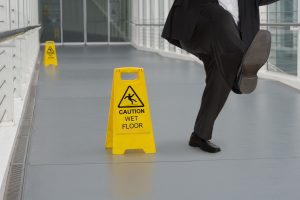Florida Slip-and-Fall On-the-Job: Beyond Workers’ Compensation

Whether you are a construction worker, nurse, or teacher, if you are injured on-the-job in a Florida slip-and-fall, workers’ compensation may be your sole source of financial recovery. Workers’ compensation is considered the exclusive remedy for most work-related injuries in Florida, meaning it is the only recourse one has against an employer. Workers do not need to prove negligence so long as they were hurt in the course and scope of employment, and in turn the employer covers the cost of treatment and a portion of lost wages during recovery.
However, workers’ compensation tends to fall short of the damages (pain and suffering, loss of life enjoyment, etc.) one could recover in a personal injury lawsuit. Because the exclusive remedy provision of Florida workers’ compensation law makes it almost impossible to win a personal injury case against one’s own employer, our South Florida slip-and-fall injury lawyers would primarily be concerned with the potential liability of a third-party property owner/controller or other liable parties. This would be someone other than your direct employer. (Note: Independent contractors are often not considered “employees” for workers’ compensation purposes and thus may be allowed to pursue injury claims against the company for whom they were working.)
Slip-and-fall cases are a type of premises liability. Premises liability is a legal concept referring to an injury caused by an unsafe or defective condition on someone else’s property. To win, a plaintiff must prove negligence (failure to exercise reasonable care) in owning/maintaining the property. The mere fact of a dangerous condition or occurrence of injury does not automatically mean the property owner was negligent. In most cases, you must prove the property owner knew or reasonably should have known the site was unsafe and failed to take proper steps to address the danger. (The exact proof burden for slip-and-fall injury claims is spelled out in F.S. 768.0755.)
It is important that if you are seriously injured at work and believe a third-party was at least partially responsible that you speak with an experienced injury lawyer about your legal options. You may have grounds to pursue additional damages beyond workers’ compensation.
Employment Waivers Could Impact Your Work-Related Florida Slip-and-Fall Case
Recently, a work-related Florida slip-and-fall injury weighed by the Fourth District Court of Appeal did not end in the employee’s favor. As our injury lawyers can explain, the case failed largely because of something called an employment waiver.
Merlien v. J.M. Family Enterprises involved a security guard who accused a client of his employer’s negligent maintenance after a stairway slip-and-fall. He might have had a fairly strong third-party liability lawsuit, but for the fact that he signed a waiver with his employer barring legal claims “from or against any customer and employees of any customer for injuries covered by workers’ compensation.”
The employee needed to show that the contract either did not clearly explain the rights he was forfeiting or that it went against public policy (somehow goes against societal interests). The trial court disagreed, finding the rights released were clearly explained, and the waiver conformed to public policy. The 4th DCA affirmed, noting the contract was in step with workers’ compensation law and pertained solely to negligent conduct – not intentional torts (when someone hurts you on purpose).
His attorneys had argued that F.S. 440.39, which allows employees injured by third-party negligence to seek compensation against those third parties, was not mentioned in the contract, and that one should not have to forfeit the right to sue a third party in order to collect workers’ compensation. (We tend to agree.)
This issue could crop up again in other appellate courts, and it is one we will be watching given that many companies across the state require employees to sign these kinds of disclaimers.
If you are injured at work and have reason to believe a third-party property owner was partly to blame, our Fort Myers injury lawyers can help.
If you are injured in Fort Myers, Naples or Key West, contact our injury attorneys at Garvin Injury Law at 800.977.7017 for a free initial consultation.
Additional Resources:
Merlien v. J.M. Family Enterprises, July 22, 2020, Florida’s 4th District Court of Appeal
More Blog Entries:
What are Tort Claims? Key West Injury Lawyer FAQ, Dec. 10, 2020, Fort Myers Slip-and-Fall Injury Lawyer Blog





 Florida Personal Injury Lawyer Blog
Florida Personal Injury Lawyer Blog










